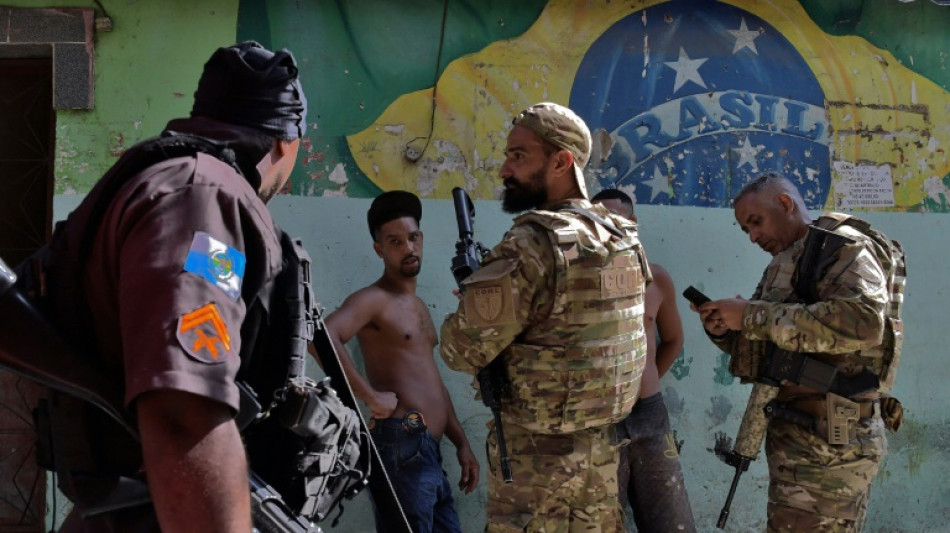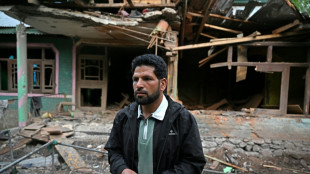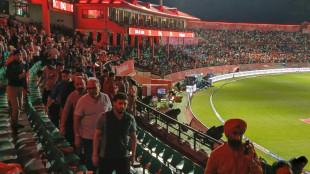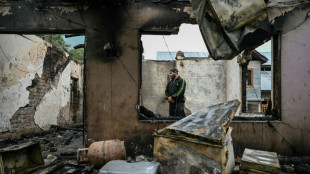
-
 Weary border residents in Indian Kashmir struggle to survive
Weary border residents in Indian Kashmir struggle to survive
-
Leo XIV says Church must fight 'lack of faith' in first mass as pope

-
 Liverpool boss Slot fears replacing Alexander-Arnold will be a tough task
Liverpool boss Slot fears replacing Alexander-Arnold will be a tough task
-
British Airways owner unveils big Boeing, Airbus order

-
 IPL suspended for one week over India-Pakistan conflict
IPL suspended for one week over India-Pakistan conflict
-
Slot says all at Liverpool sad to see Alexander-Arnold go

-
 Leo XIV celebrates first mass as pope in Sistine Chapel
Leo XIV celebrates first mass as pope in Sistine Chapel
-
India says repulsed fresh Pakistan attacks as death toll climbs

-
 Japan's Panasonic targets 10,000 job cuts worldwide
Japan's Panasonic targets 10,000 job cuts worldwide
-
Putin evokes WWII victory to rally Russia behind Ukraine offensive

-
 China exports beat forecasts ahead of US tariff talks
China exports beat forecasts ahead of US tariff talks
-
Leo XIV, the 'Latin Yankee', to celebrate first mass as pope

-
 Most stocks lifted by hopes for US-China talks after UK deal
Most stocks lifted by hopes for US-China talks after UK deal
-
IPL suspended indefinitely over India-Pakistan conflict: reports

-
 German lender Commerzbank's profits jump as it fends off UniCredit
German lender Commerzbank's profits jump as it fends off UniCredit
-
Rare bone-eroding disease ruining lives in Kenya's poorest county

-
 India says repulsed fresh Pakistan attacks as de-escalation efforts grow
India says repulsed fresh Pakistan attacks as de-escalation efforts grow
-
Zhao's historic snooker title sparks talk of China world domination

-
 'High expectations': EU looks to Merz for boost in tough times
'High expectations': EU looks to Merz for boost in tough times
-
Poisoned guests rarely invited before deadly mushroom lunch, Australia trial hears

-
 China sales to US slump even as exports beat forecasts
China sales to US slump even as exports beat forecasts
-
Indian cricket to make 'final decision' on IPL over Pakistan conflict

-
 Dethroned Bundesliga champions Leverkusen face uncertain future
Dethroned Bundesliga champions Leverkusen face uncertain future
-
China can play hardball at looming trade talks with US: analysts

-
 French monuments in trouble while PSG prepare for Champions League final
French monuments in trouble while PSG prepare for Champions League final
-
Newcastle face Chelsea in top five showdown, Alexander-Arnold in spotlight

-
 Flick's Barca must show 'hunger' in crunch Liga Clasico
Flick's Barca must show 'hunger' in crunch Liga Clasico
-
Clasico the last chance saloon for Ancelotti's Real Madrid

-
 Timberwolves overpower Warriors to level series
Timberwolves overpower Warriors to level series
-
Chinese fabric exporters anxious for US trade patch-up

-
 Putin gears up to host world leaders at lavish army parade
Putin gears up to host world leaders at lavish army parade
-
Nearing 100, Malaysian ex-PM Mahathir blasts 'old world' Trump

-
 Leo XIV, first US pope, to celebrate first mass as pontiff
Leo XIV, first US pope, to celebrate first mass as pontiff
-
Asian stocks lifted by hopes for US-China talks after UK deal

-
 Former head of crypto platform Celsius sentenced 12 years
Former head of crypto platform Celsius sentenced 12 years
-
Ex-model testifies in NY court that Weinstein assaulted her at 16

-
 Strawberry Fields REIT Announces First Quarter 2025 Operating Results
Strawberry Fields REIT Announces First Quarter 2025 Operating Results
-
Amphastar Pharmaceuticals to Present at the 2025 Bank of America Health Care Conference

-
 Ascendant Resources Announces Closing of Second and Final Tranche of Non-Brokered Private Placement
Ascendant Resources Announces Closing of Second and Final Tranche of Non-Brokered Private Placement
-
Nestlé and OMP Showcase Approach to Future-Ready Supply Chain at Gartner Supply Chain Symposium/Xpo in Barcelona

-
 Genflow Biosciences PLC Announces Share Subscription, Director's Dealing and Update
Genflow Biosciences PLC Announces Share Subscription, Director's Dealing and Update
-
Argo Blockchain PLC Announces 2024 Annual Results and Restoration of Listing

-
 'Great honor': world leaders welcome first US pope
'Great honor': world leaders welcome first US pope
-
Pacquiao to un-retire and fight Barrios for welterweight title: report

-
 Trump unveils UK trade deal, first since tariff blitz
Trump unveils UK trade deal, first since tariff blitz
-
Man Utd one step away from Europa League glory despite horror season

-
 Jeeno shines on greens to grab LPGA lead at Liberty National
Jeeno shines on greens to grab LPGA lead at Liberty National
-
Mitchell fires PGA career-low 61 to grab Truist lead

-
 AI tool uses selfies to predict biological age and cancer survival
AI tool uses selfies to predict biological age and cancer survival
-
Extremely online new pope unafraid to talk politics


Brazil seeks to fight police violence with body cams
Seeking to curb chronic police violence, Rio de Janeiro plans to start using officer body cams, a measure that has shown promising results elsewhere in Brazil but that experts say won't be a panacea.
Brazil has one of the worst police violence problems in the world: last year, more than 6,100 civilians died in police operations and 183 officers were killed, according to figures from watchdog group The Violence Monitor.
In a country where shootouts involving law enforcement and heavily armed drug gangs are regular occurrences in the favelas, or slums, police also face frequent accusations of abuses and indiscriminate violence.
But officers are rarely held to account over the use of force, according to Cesar Munoz, senior researcher for Brazil at Human Rights Watch.
"Whenever the police are involved in a shootout and someone dies, the standard line is, 'We were on patrol, they attacked us, we responded and the attackers died,'" he told AFP.
"Body cams could be a useful way to both document the police's actions and protect them from unfounded accusations."
Typically around eight by six centimeters (three by two-and-a-half inches), the digital cameras are attached to the front of officers' uniforms.
They have delivered encouraging results in states where they are already in use in Brazil, such as Sao Paulo in the southeast and Santa Catarina in the south.
According to official figures, violent incidents fell by 87 percent among units using body cams in Sao Paulo, which implemented the measure last year, along with other changes, such as the use of non-lethal weapons.
In Santa Catarina, academic research found the cameras have been responsible for reducing the use of force by police by more than 60 percent since 2019.
The cameras are also credited with helping police provide more accurate accounts of incidents such as domestic violence.
- 'Piecing together a puzzle' -
Rio plans to start rolling out around 8,000 of the cameras on patrols in areas ranging from upscale beach neighborhood Copacabana to the favelas of Mare and Jacarezinho, state police said.
Jacarezinho was the scene of the bloodiest police shootout in the city's history in May last year when a massive anti-drug trafficking operation ended with 27 alleged suspects and one policeman dead.
Body cams "would have helped determine what happened" in numerous deaths that day, prosecutor Andre Cardoso, the lead investigator on the case, told news site G1.
As things stand, most of the killings remain unresolved. Just four police and two alleged drug traffickers face charges.
"When you search for evidence, you're trying to piece together a puzzle, reconstruct the situation. With video footage, you don't need anything else," Cardoso said, calling the cameras "indispensable."
Body cams could also help hold police to account over other accusations they face in Jacarezinho, such as invading people's homes and stealing from them -- as one resident documented with a hidden camera.
But "cameras aren't a panacea," warned Munoz.
"They have to be part of a broader policy" that includes more training, psychological support for officers and truly independent investigations, he said.
- Unanswered questions -
Body cams are already widely used in the Americas, including in Canada, many parts of the United States, Mexico and Chile.
Their success in Brazil will depend on how they are used, said Melina Risso, research director at the Igarape Institute, a public security think tank.
"Will the camera automatically film 24 hours a day, or does it have to be turned on? Who supervises the recording? How long are the images stored? What is the chain of custody? How will officers' privacy and that of others be protected?" she said.
In Sao Paulo, a low-quality recording with no sound is taken throughout officers' shifts; they are instructed to activate a second, higher-quality recording whenever they respond to an incident.
Rio state police told AFP their cameras would record automatically, with the images archived for around 90 days.
They said protocols on the cameras would be adjusted as necessary over time.
P.Mathewson--AMWN